Every summer, residents in the capital city of Hanoi, and the northern region in general, have to endure the scorching heat. The weather in Saigon is hot all year round. The temperature is predicted to be over 40 degrees Celsius outside, making it difficult for many people to go to school or work. Even worse, those who use motorcycles or bicycles suffer from the hot and burning saddle.
Video of trying out a cooling spray for motorcycle saddles
Under the scorching sun, motorcycle and bicycle saddles become a “frying pan” that can reach over 60 degrees Celsius after just a few minutes of “sunbathing”. This not only affects the vehicle but also has negative psychological and physical effects on the rider. Not long ago, I came across an interesting advertisement on social media for an instant cooling spray that can cool down the motorcycle saddle immediately upon use.
So, what is the true effect of this product? Let’s evaluate the effectiveness of this instant cooling spray in a new section of Tinxe called Buy or Not.
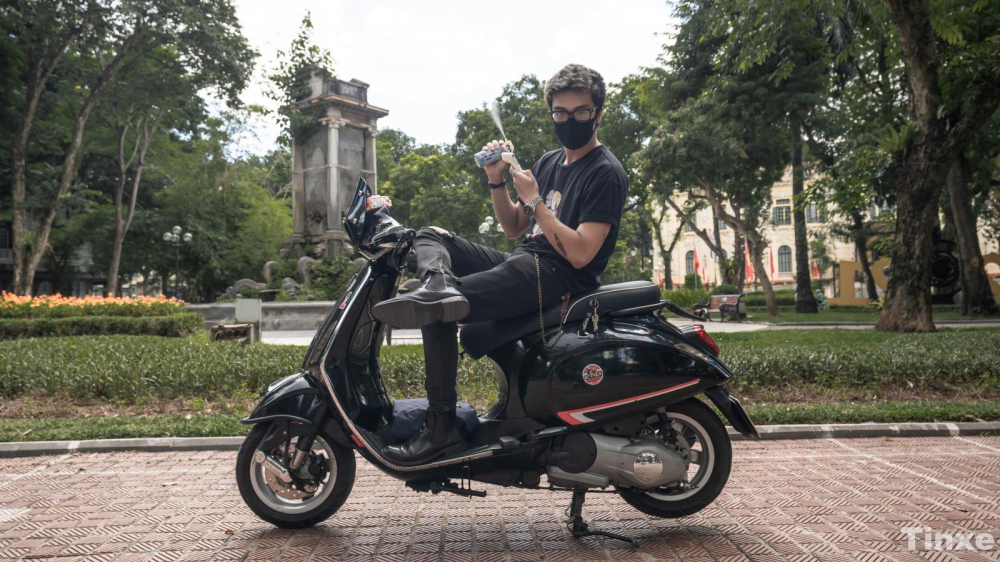
What is the Instant Freeze Cool spray and how much does it cost?
Instant Freeze Cool: Buy or Not
Product Name: Instant Freeze Cool BOTNY 180ml Motorcycle Cooling Spray
Price: 100,000 VND
Ingredients: Cooling agent, peppermint essential oil
Size: 15 x 5.2 x 5.2 cm Weight: 180g Volume: 180ml
Packaging: Metal spray bottle
Origin: China
Expiration date: 3 years from the date of manufacture printed on the packaging
Advertising claims: Quickly cools the interior of cars, motorcycle saddles, cools the body…, eliminates car odors.
How to use: Spray on the surface that needs to be cooled, wait for 3-5 seconds to see the effect (shake well before use)
According to the advertisement, this cooling spray has a capacity of 180ml and is capable of quickly cooling down any object or small space. The usage note for this product is to keep a distance of more than 30cm and not to spray continuously on one area for a long time to avoid frostbite or cold burns. The price of this cooling spray is around 100,000 VND on e-commerce platforms such as Shopee or Lazada.
Real-life test of using the cooling spray to cool down the motorcycle saddle
Currently, many people have at least once seen advertisements for cooling sprays that cool down the motorcycle saddle and car interiors. However, after our real-life test, we found that this spray did not provide the desired effect on a motorcycle saddle exposed to outdoor sunlight.
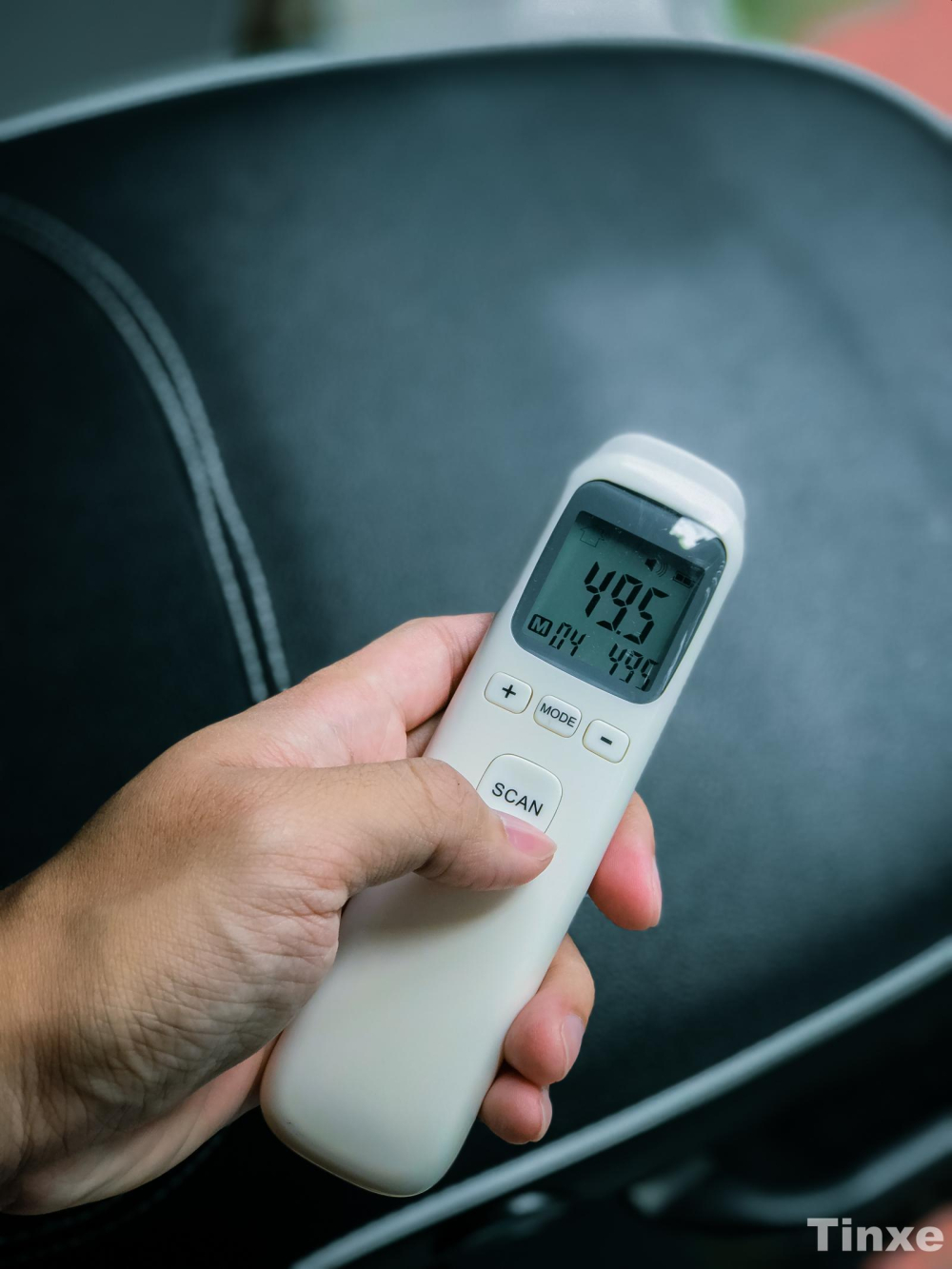
The saddle temperature reaches nearly 50 degrees C after a few minutes of sun exposure
First, we parked the motorcycle under the sun, and the temperature of the saddle quickly rose to almost 50 degrees Celsius after a few minutes. When the saddle reached a high temperature, we conducted the first test by spraying the cooling spray in a mist form, from a distance of 30cm from the saddle, and then measured the temperature after spraying. The result was that the temperature of the saddle dropped to 46.3 degrees Celsius, a decrease of only 3 degrees Celsius.
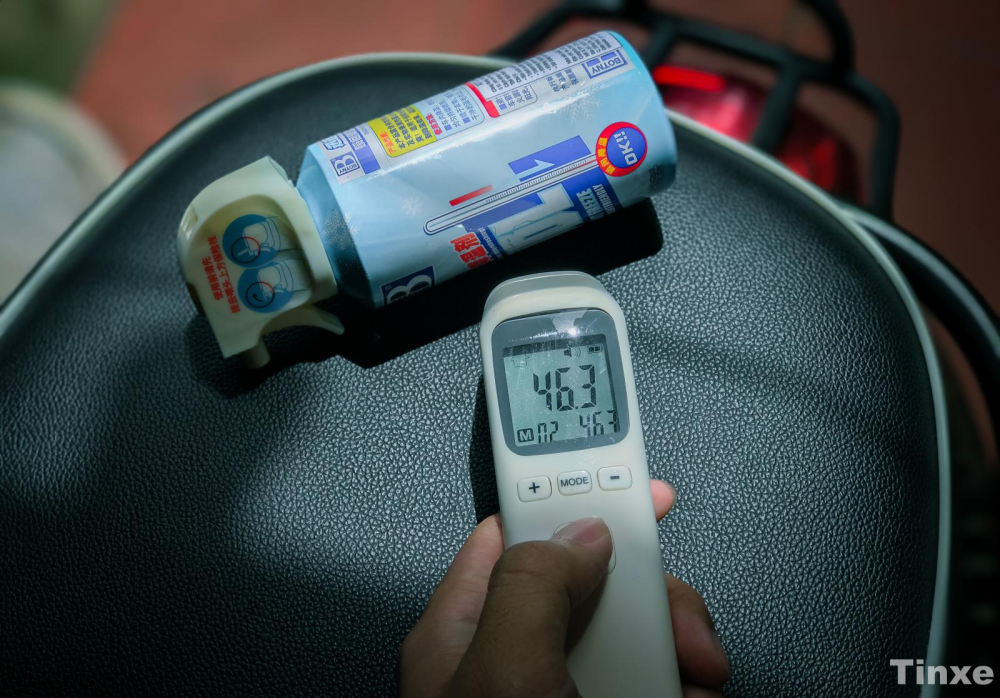
The temperature only decreases by 3 degrees Celsius when sprayed from a distance of 30cm and sprayed on the entire saddle
In the second test, we brought the cooling spray closer to the saddle and sprayed it heavily on a small area, resulting in a better result as the temperature at that point on the saddle decreased significantly.
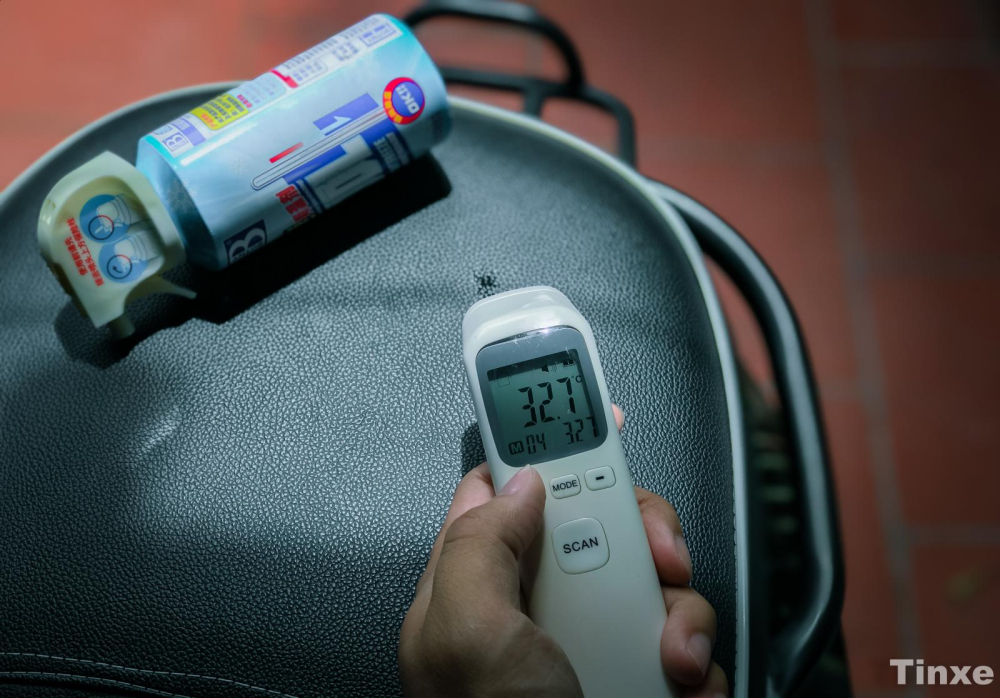
The temperature drops to 32.7 degrees Celsius when the spray is focused on one spot and closer to the saddle
However, with a spray bottle with a capacity of only 180ml, after 2 or 3 sprays on the saddle to cool it down, the spray ran out quickly, making the cost of cooling the saddle with this spray quite expensive. Furthermore, spraying the saddle thoroughly to cool it down is time-consuming. The advantage of this method is that it does not wet the saddle, has a pleasant scent, and looks modern.
Comparison of the cooling effect with other methods
Generally, we have a few basic methods such as shading the saddle from direct sunlight or splashing water or wetting the saddle to cool it down. So, does the “instant cooling” spray provide better results? We tested it and compared it with the two most basic methods of cooling the saddle to obtain quite surprising results.
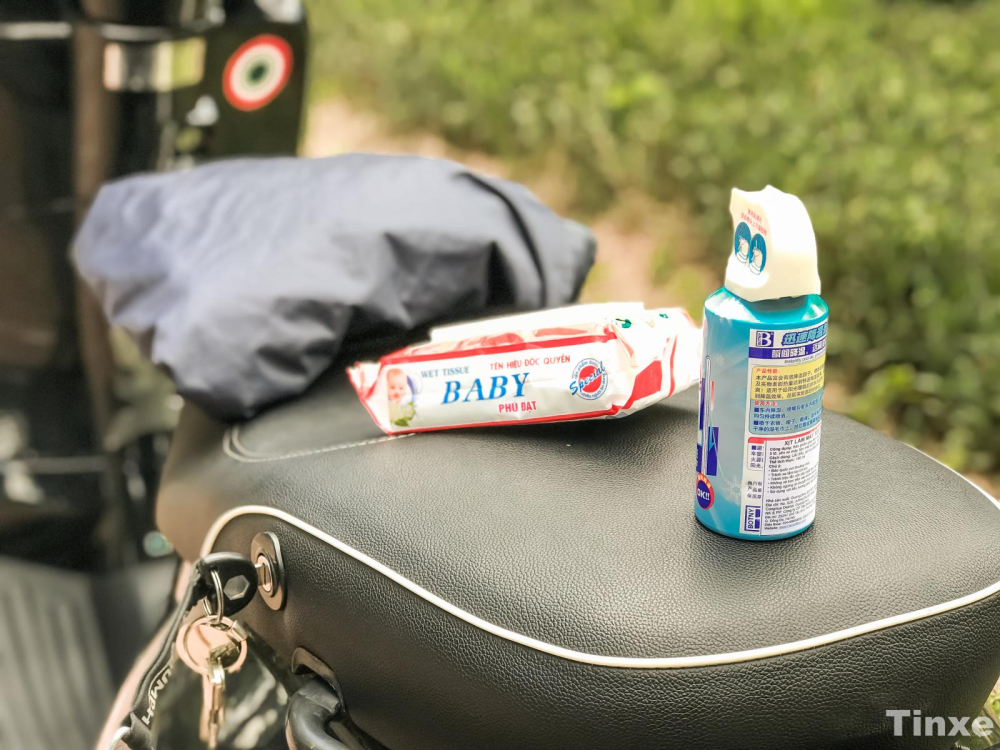
Comparison of the effectiveness of three common methods of cooling the saddle
Using a raincoat to shade the saddle
The first method we mentioned is using a raincoat to cover the saddle. A raincoat is a common item that most motorcycle users always carry with them. With a raincoat, you can fold it into 2 or 3 layers depending on its size, and use it to cover the saddle whenever you have to park in a place without shade. If you are careful, you should fold the edges of the raincoat down under the saddle and close the trunk to avoid theft.

Folded raincoats used to cover the saddle to shade it from the sun, the temperature measured on the raincoat after a few minutes of sun exposure is 48 degrees.
Through direct testing, the temperature on the raincoat after a few minutes of sun exposure reached 48 degrees Celsius. However, the saddle underneath remained cooler, maintaining a temperature of about 38 degrees Celsius, which was sufficient to make the rider feel comfortable.
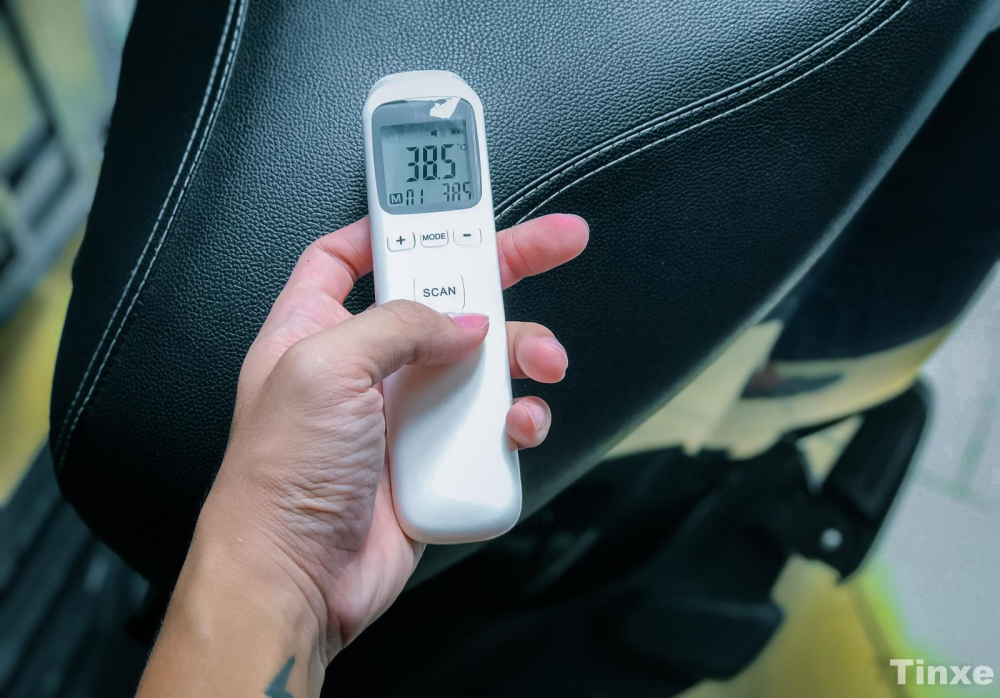
The temperature remained at around 38.5 degrees Celsius below the raincoat
With this method, the saddle will not be exposed to direct sunlight and will not heat up too much, allowing the rider to use the motorcycle immediately when needed. However, the downside of this method is that not every motorcycle has a large enough trunk to store a raincoat big enough to cover the saddle. Moreover, covering and folding the raincoat takes a lot of time and users need to do it under the hot sun.
Using water or wet paper to cool the saddle
After testing the above method, we will experiment with using water or wet cloth to cool the saddle. With this method, a pack of wet wipes may be cleaner and more convenient for the rider to carry compared to a bottle of water and a towel.
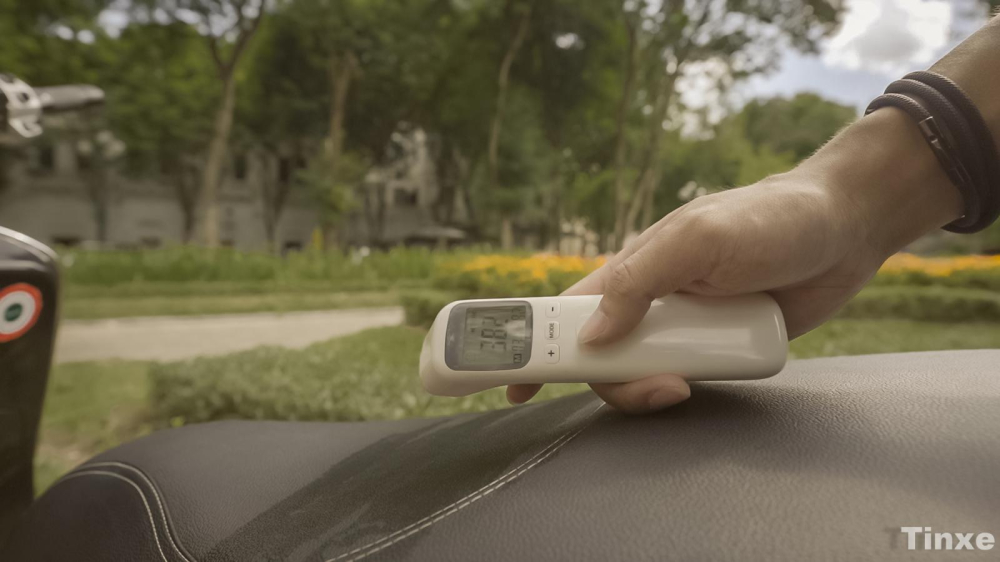
Using wet paper to cool the saddle leaves large water spots
The advantage of using wet wipes or filtered water to cool the saddle is the ability to quickly cool down the motorcycle saddle after sun exposure. After being “cooked” at a temperature of 50 degrees Celsius, wiping the saddle with a wet cloth can reduce the temperature significantly to around 38 degrees Celsius, which is a suitable temperature for the rider to use their motorcycle.
However, this method also has its drawbacks, such as wetting the saddle and requiring the user to wait before using it. Moreover, if cold water is used to pour on the saddle, there is a high chance of cracking the casing or tearing the saddle when the temperature changes abruptly. Note that if you leave a bottle of water and a wet wipe in the trunk of the motorcycle and expose it to the sun, the temperature of the water and the wet wipe will also increase, leading to a decrease in their cooling effectiveness.
Conclusion
After testing the three basic methods to cool the saddle on a Vespa, it can be seen that using a raincoat to cover the saddle is the best method for motorcycle users, especially scooter riders. A raincoat is not only necessary to carry, but also helps protect the motorcycle from rain and shade it from the sun. Most importantly, it helps maintain the rider’s health during hot summer days.
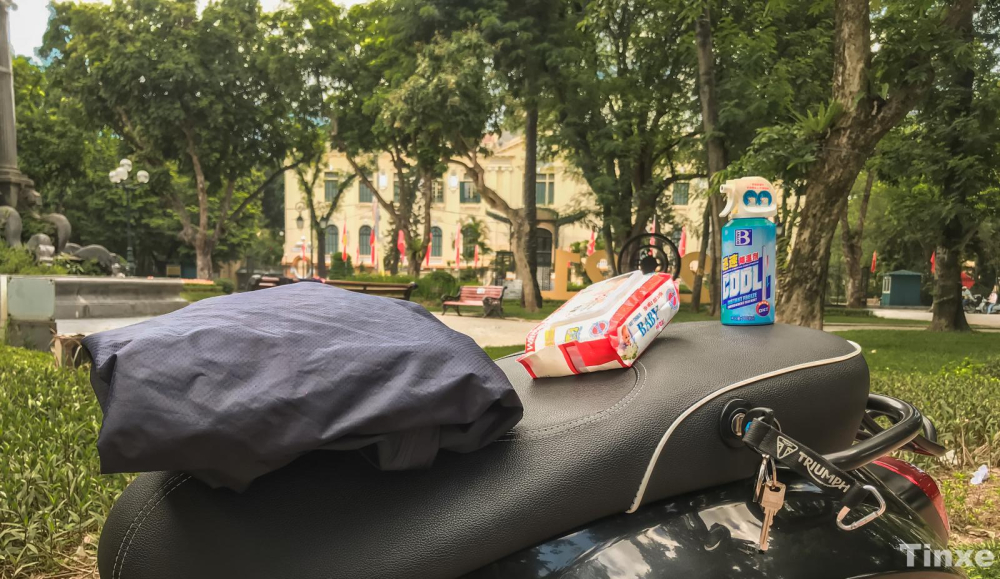
Using a folded raincoat to cover the saddle is the most optimal method for cooling for motorcycle users
As for the hyped-up cooling spray, we recommend avoiding it to prevent wasting money on a product that is not cost-effective.
Kuro





































